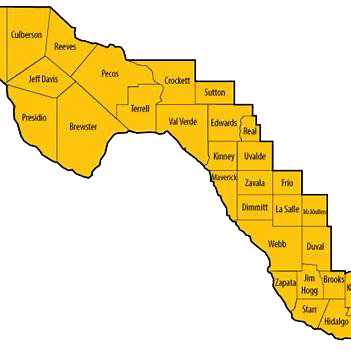Every legal professional has seen it happen: a defendant ducks service, and suddenly you’re scrambling to meet deadlines, filing a motion for alternate service, or worse—risking dismissal.
Across its 254 counties, Texas is wide open space for evasive defendants. Locked ranch gates at rural addresses, high-rise hideouts in the cities, and one very large international border can all complicate the job for Texas process servers.
But even when they’re surrounded by the Wild West, servers in this state know how to keep their cool, get it right the first time, and keep a case from stalling.
Who Has the Right Stuff to Be a Texas Process Server?
The Lone Star State is more than a little picky about who gets to provide service of process.
Under TRCP Rule 103 (Civil District/County Courts), authorized individuals who may serve process are:
- Sheriffs or Constables
- Automatically authorized statewide.
- Private process servers certified by the Texas Judicial Branch Certification Commission (JBCC)
- Must hold a valid Process Server Certification (7-hour course, fingerprinting, state and national background check).
- Certification is good for 2 years and requires continuing education for renewal.
- Required for most private civil cases.
- Persons authorized by a court order
- Courts may issue an order allowing a non-certified individual to serve process in a specific case.
- Must be at least 18 years old and not a party to the case.
Under TRCP Rule 501.2(e) (Justice Courts / Small Claims):
- Service can also be completed by:
- Sheriff or constable,
- JBCC-certified server,
- Or any person approved by the court who is over 18 and not a party to or interested in the case.
While Texas process servers jump through their share of hoops, the payoff is that a certified process server can serve court documents anywhere in Texas—not just the county in which they reside.

Service of Process for Evasive Defendants in Texas, By the Book
When defendants avoid service in Texas, Rule 106 gives legal teams and process servers a clear playbook that begins with in-person service through a sheriff, constable, or certified process server.
If those attempts fail, the rules allow substitute service after first filing file a Rule 106(b) motion—showing a full record of attempts.
Among the alternatives that may be proposed are:
- Handing papers to someone older than age 16 years at the residence.
- Mailing the documents.
- Using email or social media (Rule 106(b)2).
Getting the serve isn’t enough—the paperwork must be airtight.
Return of Service
Under Rule 107, your Return of Service needs to state who was served, when, where, and exactly how—but it also must detail missed attempts, affidavit info if you used substitute service, server credentials, and mailing receipts when required.
Plus, Texas gives you 90 days from issuance of the citation to complete service—or risk dismissal.
It’s Borderline, But Not Impossible
The Texas border with Mexico—all 1,254 miles—is a haven for process serving cat-and-mouse.
Along this boundary are 14 counties (Figure 1) with topography ranging from arid brush country in the west to the hurricane-prone Gulf of Mexico in the south.
Figure 1.

There are also at eight binational sister-city communities such as El Paso, Texas and Ciudad Juarez, Mexico, that beckon with the opportunity to evade service with a casual stroll across a bridge.
Once a defendant crosses into Mexico, service of process is guided by international law—and the sluggish machinery of the Hague Service Convention.
How sluggish?
How does three to six months sound?
Two more considerations for serving in Mexico via the Hague Service Convention:
- Service by mail is not permitted.
- All documents must be translated into Spanish.
If you were thinking to do an end run into Mexico with the U.S Marshals Service, you’re out of luck. United States Marshals are not allowed to serve process or deliver documents in foreign countries, even if ordered by the court.
Border Hopped? You Can Still Get the Serve
Once a defendant moves across the border, the Hague Service Convention is really the only game in town. It’s a slow game, to be sure, but certainly winnable. Here’s the sequence from a high-level view:
1. Submit a Hague Service Request
Place a formal request with the Office of International Judicial Assistance, typically through your local court clerk or designated judicial officer.
2. Engage with Mexico
Transmit the request to Mexico’s Central Authority, which coordinates formal service through Mexican channels.
3. Prepare Complete Translations
Summons, complaint, attachments —all must be fully translated into Spanish.
4. Allow Time for Processing
Set expectations, be patient, and plan case calendars accordingly.
Nation Within a Nation
There’s more than just one national border to challenge a Texas process server.
Your case may involve one of Texas’ three federally recognized tribal nations that create what are essentially tri-national regions.
The Native Graves Protection and Repatriation Act recognizes tribal sovereignty and a tribe’s own self-governing powers. If service of process on native lands is new to you, you’ll need to tread carefully.
For Texas process servers, this means understanding the nuances of tribal law and proactively consulting tribal courts and local law enforcement before attempting service.

Houston, We Have a (Service) Problem
In cities like Houston, Dallas, and Austin, evasive defendants don’t need to run. Instead, they can just hide behind layers of infrastructure.
Gated communities, high-rises with concierge security, and office parks all create real-world barriers for process servers. Even when a server has the correct address, access is another story entirely.
And, evasion isn’t just for the faceless everyday Joe. High-profile defendants know how to work the system, too.
- In 2022, Texas Attorney General Ken Paxton allegedly fled his home in a truck driven by his wife to avoid a subpoena—an event witnessed and documented by the process server.
- In 2024, South Dakota Governor Kristi Noem was accused of being “evasive and threatening” during a service attempt tied to a Texas-based lawsuit.
These marquee names aren’t outliers so much as “reminders”—that urban service of process in Texas requires more than a knock on the door. It takes planning, local knowledge, and process servers who stays cool under pressure.
Some of the tactics successful Texas process servers may have to use with an evasive defendant in the big city includes:
- Tracking schedules
- Observing entrances
- Using pretext strategies
Each approach is fully documented, of course, to withstand a challenge in court.

On the Streets of Laredo
Down in counties like Hidalgo, Starr, and Webb—where the city of Laredo is the county seat— the view looks considerably different than in the big city.
For starters, serving papers can mean miles of unmarked roads, locked gates, and driveways that sometimes also serve as cattle trails.
Cultural and language gaps are everywhere: Spanish-speaking households dominate, and a stranger knocking on the door may be met with skepticism—or silence.
And, the further south the serve is to be made, the greater the risk.
The South Texas border is a corridor for drug smuggling, and San Antonio is where many of those drugs are staged to be shipped to the rest of the county.
Texas process servers who work these areas know the dangers. They are sometimes advised not to serve without law enforcement awareness, which may add complexity to service but is unquestionably worthwhile.

How Texas Process Servers Successfully Serve Evasive Defendants
Regardless of whether you’re going after a local political boss or serving papers for a garden-variety collections case, you’ll want a professional process server who not only knows the area, but is willing to answer direct questions about “how to” and “what with”.
Since tacking down evasive defendants in Texas requires more than just binoculars and a clipboard, qualify your service of process vendor with these questions:
Experience
- How many evasive serves have you completed this year?
- Are you familiar with this county’s service rules?
- Have you handled high-rises, gated homes, or rural areas?
Documentation
- Do your proofs meet Texas court standards?
- How do you log multiple attempts and times of day?
- Will I get real-time updates and a court-ready return?
Communication and Technology
- Do you use skip tracing? Which tools?
- Can you provide GPS, photo, or time-stamped records?
- How fast do you report status or flag problems?
To make your vendor evaluation easy, and even more detailed, use The Process Server Evaluation Scorecard for Law Firms.
Texas Process Serving Success Strategy
If you’re dealing with an evasive defendant in Texas, bring your A-game. Or better yet, bring a partner who already knows how the game is played.
Rapid Legal has vetted Texas process servers who have had their boots-on-the-ground long enough to know the terrain. They’re equipped with real-time tracking, GPS-stamped proofs, and expert navigation of county-specific rules to successfully navigate the nuances that can derail service of process.
Need to serve an evasive defendant (or anyone) in the Lone Star State?
Pull up a chair and have a chat with one of our account executives about process serving today. We have a solution for evasive parties deep in the heart of Texas or anywhere else nationwide.
